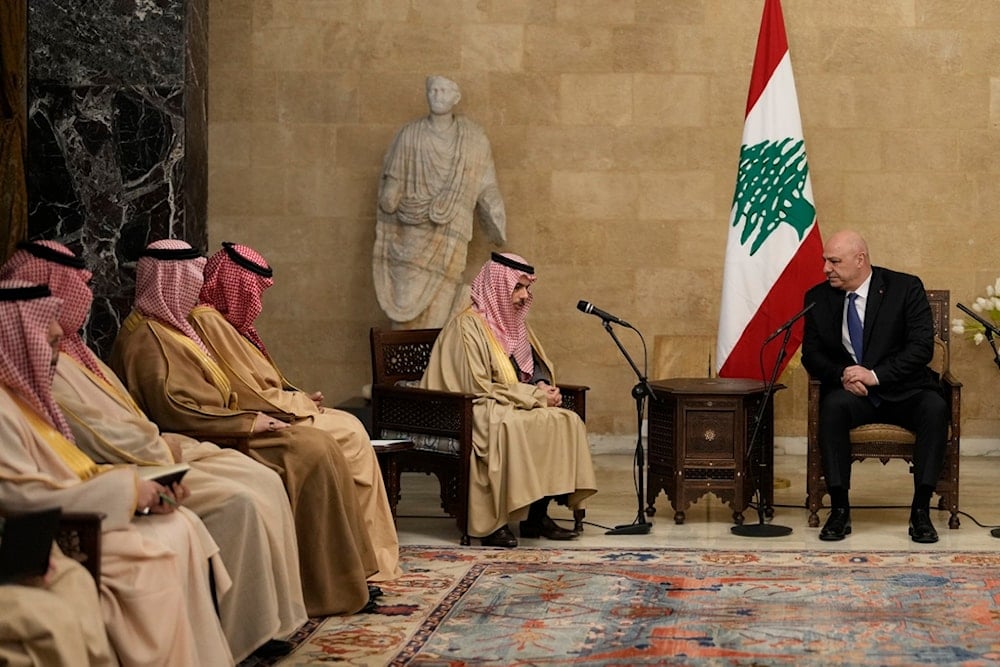Lebanon's Aoun meets Saudi foreign minister, talk about bilateral ties
Saudi's foreign minister visits Lebanon on a landmark visit to meet with the new president and the prime minister-designate.
-

Lebanese President Joseph Aoun, right, meets with Saudi Arabia's Foreign Minister Prince Faisal bin Farhan al-Saud at the presidential palace in Baabda, east of Beirut, Lebanon, Thursday, Jan. 23, 2025 (AP)
Lebanese President Joseph Aoun met with Saudi Foreign Minister Prince Faisal bin Farhan at the Baabda Palace on Thursday, marking the minister's first visit to Lebanon in 15 years. The meeting underscored the strengthening ties between the two nations and Saudi Arabia's pivotal role in supporting Lebanon during a critical period.
During the meeting, President Aoun expressed gratitude for Saudi Arabia's efforts in assisting Lebanon, particularly in ending the presidential vacancy. He described the visit as a "message of hope" and emphasized the importance of implementing his inaugural address, which he said reflects the aspirations of the Lebanese people.
Aoun outlined the priorities for the coming phase, which include reconstruction, addressing the economic crisis, and bolstering the military and security institutions. He also called for renewed Saudi engagement in Lebanon, recalling the historical bonds between the two countries and hoping for stronger bilateral relations across all fields.
Prince Faisal conveyed greetings from King Salman bin Abdulaziz and Crown Prince Mohammed bin Salman to President Aoun, congratulating him on his election. He affirmed Saudi Arabia's commitment to supporting Lebanon's path toward prosperity, highlighting the significance of President Aoun's inaugural speech as a guiding framework for reform.
Saudi stresses importance of ceasefire
The Saudi foreign minister also stressed the importance of adhering to the ceasefire agreement and the full withdrawal of Israeli forces from Lebanese territories in line with UN Security Council Resolution 1701. He reiterated Saudi Arabia's readiness to support Lebanon step by step in collaboration with international partners.
Prince Faisal emphasized the critical nature of reforms planned by the incoming Lebanese government, noting Crown Prince Mohammed bin Salman's openness to initiatives that would pave the way for Lebanon's brighter future. "Despite the shared challenges in the region, the Kingdom views Lebanon's future with optimism, particularly under the reformist approach outlined by President Aoun," he said.
The meeting was attended by high-level delegations from both sides, reflecting the importance of the visit. The Saudi delegation included Minister Faisal's advisor, Yazid bin Farhan, Ambassador Walid Bukhari, and other key officials. The Lebanese side was represented by Foreign Minister Abdullah Bou Habib, senior presidential advisors, and officials from the President's Office.
Bin Farhan visits PM-designate
Following this, Prime Minister-designate Nawaf Salam hosted bin Farhan along with his accompanying delegation at his residence in Koraytem.
During the meeting, Prince Faisal congratulated Prime Minister-designate Salam on his appointment, reaffirming Saudi Arabia's support for Lebanon. He urged the Lebanese to prioritize the nation's higher interests over narrow political agendas and to proceed with essential reforms.
Prime Minister-designate Salam welcomed the Saudi foreign minister, emphasizing the significance of this visit, which comes 15 years after the last visit of a Saudi foreign minister to Lebanon.
Salam highlighted the exceptional opportunity currently available for Lebanon and stressed the importance of not letting it slip away. He confirmed his full cooperation with the President in this regard.
The prime minister-designate reiterated his commitment to implementing the necessary political, judicial, administrative, and financial reforms. He also expressed his dedication to restoring Lebanon's natural place in the Arab world and re-establishing its role alongside its brotherly Arab nations.
Aoun elected president
Lebanese legislators in early January voted for Aoun after they failed to secure the necessary two-thirds majority (86 votes) in the first round of voting earlier in the day, which is required for Aoun, as the army chief, to win.
After 71 deputies voted for the army commander in the first round, he won in the second round, with 99 recorded votes.
It is worth noting that all 128 Lebanese representatives participated in the presidential election, with ambassadors from several countries in attendance, including those of the United States, Saudi Arabia, Iran, Qatar, Egypt, and China.
Joseph Aoun has served as the Commander of the Lebanese Army since March 8, 2017, succeeding General Jean Kahwaji. His military career began in 1983, marking the start of his long service in the army.
He was promoted to brigadier general in 2013 and continued to rise through the ranks, achieving the rank of General in 2017. That same year, he was appointed Commander of the Army, leading during one of the most sensitive periods in Lebanon's history.

 4 Min Read
4 Min Read








